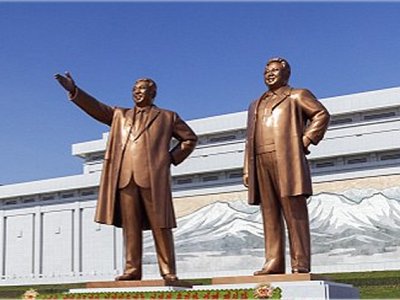
SETH ROGEN VERSUS KIM JONG-UN
What should we make of a comedy positing the assassination of a North Korean despot?
As free publicity for a Christmas release, the intervention of the People’s Republic of North Korea over the movie, The Interview, could hardly be bettered. Starring comedians Seth Rogen and James Franco, it concerns a CIA plot to use two journalists to assassinate Kim Jong-un after they secure an unprecedented interview with the regime’s leader.
After months of objections to Sony Pictures, the White House and the United Nations, where the film was variously described as ‘a wanton act of terror’ and ‘a blatant act of war’, matters took a sinister turn when Sony was subject to a massive cyber attack in late November 2014. This shut down the company’s entire computer network, deleting huge numbers of files and corrupting records.
This is not the first film to use North Korea’s hostile regime for plot purposes. Olympus Has Fallen (2013) posited the storming of the White House by North Korean guerrillas, while in Die Another Day (2002), James Bond leads a mission to North Korea where he meets a nasty fate. Neither of these films provoked offence in the North Koreans; in fact Kim Jong-il took a liking to the depiction of his regime in the latter. Clearly there is a preference for being seen as strong and cruel rather than a figure of fun. It was ever so with despots.
The appeal to President Obama to ban the film was hardly going to work in a country constitutionally committed to free speech. All such rights should be balanced by responsibilities in rounded liberal societies and so there might be questions about the wisdom of imagining the assassination of a real political leader, however malevolent they may be. A comedy about the killing of a democratically elected leader would undoubtedly be viewed as being in poor taste. In reality, rights are now balanced more by risks than by responsibilities, by the notion of what we can get away with than by what we owe others. This is why The Interview is not a comedy about the killing of Vladimir Putin or a radical Islamist leader.
There is, however, an overwhelming case for iconoclasm when political leaders arrogate power and wealth to their coterie at the inhuman expense of others, as has happened in North Korea. No weapon is quite as powerful as humour in puncturing hubris. Kim Jong-un has obtained a godlike status in a country officially committed to godlessness, making himself a target too big to miss and too tempting to ignore. There is something at once both spiritual and subversive about casting the mighty from their thrones, even if we are only imagining it at the time.
The fall of the North Korean regime is an altogether less funny picture in its implications. It possesses nuclear weapons, courtesy of the know-how of Pakistan’s rogue scientist A.Q. Khan, and may not hesitate to use them in a final act of malice given the capacity to do so. The country, already critically impoverished, would collapse economically, producing a torrent of refugees eager to cross into China or South Korea, neither of which is geared up to managing the expected size of flow. Then the scale of human rights abuses would emerge, provoking a reckoning, either formally through the law or informally through the mob, for sickening crimes against humanity.
Ridiculous political despots are no laughing matter when it comes to dealing with their legacy.
POPULAR ARTICLES

Obama's Covert Wars
The use of drones is going to change warfare out of all recognition in the next decades.

Through A Glass Starkly
Images of traumatic incidents caught on mobile phone can be put to remarkable effect.

What Are British Values?
Is there a British identity and if so, what has shaped the values and institutions that form it?


